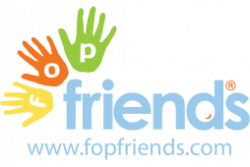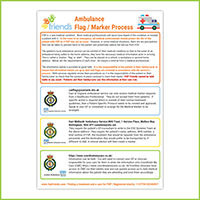FOP and the EYFS Setting

Starting nursery school is an exciting time for any child and a significant milestone in their young life.
As a parent, it’s natural to have a mix of emotions when your little one starts nursery school but these feelings are often magnified when your child has a complex health condition such as FOP. You may be reassured that most children with FOP go to pre-school; they have a happy and successful time there, and thrive on the experience.
We understand that every child is an individual, but when dealing with FOP, there are some additional considerations to keep in mind. However, with careful planning and communication between the home and the setting, these challenges can be managed to provide the best opportunity for the child to succeed.
Remember, FOP is just one part of your child’s story. They are so much more than their diagnosis, and school is the perfect place for your child to experience a whole new world – it’s there, just waiting to be discovered.




First steps
We have produced a guide ‘Supporting a child with FOP: a practical guide to their learning journey’, and it is available free to settings, or can be downloaded from the link below. The book contains more detailed guidance on the various phases of a child’s time in school, from EYFS through to high school.
We have put together some tips for parents and settings when embarking on this new chapter in the child’s life. We hope you find them helpful.
* Celebrate the milestone! The first and foremost thing is to celebrate this moment. It’s a significant step in your child’s young life and they are embarking on a new adventure.
* Stay positive: Children are sensitive to their parents’ emotions. Be positive and enthusiastic when talking about nursery. Your child will pick up on your attitude and feel more excited about the experience. It’s ok to feel anxious about your child being away from you (most FOP parents have been exactly where you are), but try not to let your child pick up on those anxieties if you can. Reach out to other parents who will be able to share your feelings.
* Visit the nursery in advance: Take your child for a few visits to the nursery before their official start date. This helps them become familiar with the environment, teachers, and other children, making the transition smoother.
* Communication: Open and clear communication with the teachers, staff and other parents is essential. Ensure that everyone is aware of your child’s condition, any limitations they may have, and any specific requirements.
* Encourage independence: While providing support, also encourage your child’s independence. Teach them how to advocate for themselves and manage their condition as they grow. While a teaching assistant is essential to supervise and guide the child, ensure the child also has opportunity to just enjoy being with their friends without constantly being in the company of an adult, as ‘helicoptering’ can have a real negative impact on the child’s friendships.
* The Individualised Education Plan (IEP): Work with the school to create an IEP tailored to your child’s needs. This plan can include modifications, accommodations, and extra support to help them succeed academically. This should be a working document, and flexible to change, as FOP can create new challenges overnight, so settings will need to be responsive to this.
* What is FOP? Provide training on What is FOP? FOP Friends can provide further information and guidance to settings on request. Ensure the setting has access to the International Clinical Council for FOP’s Treatment Guidelines, and all staff know where to find them.
* Medical support: Ensure that the nursery staff are aware of your child’s medical condition. Ensure that all staff, including agency staff, are aware that a trip or fall needs to be managed differently to most of the other children in the setting. Agree procedures for simple bumps to more serious falls or accidents. Ensure that staff know where any medication is kept and when to administer it. The local ambulance service should also be notified so that, in the event of an emergency, they are aware of the guidelines.
* Safety first: EYFS settings are dynamic, bustling and busy places as children scurry about, absorbed in their own worlds. However, it is essential that the learning environment is kept as risk-free as possible. Use it as a teaching opportunity to encourage all children to pick up their toys after they have played with them. Keep floors and walkways clear of trip-hazards. Ensure water and sand-play areas are on a non-slip surface. The child’s teaching assistant can monitor the environment with on-the -go risk assessments.
* Accessible environments: Ensure the learning environment is accessible, with grab rails, non-slip flooring, any changes in floor height clearly demarcated. An OT can assist with assessments and adaptation. Ensure resources aren’t located too high or too low, depending on the child’s restrictions.
* Furniture: Make sure all furniture is at the correct height. Make sure that chairs and stools don’t tipple over easily.
* Assistive devices: If your child needs assistive devices, such as a specialised chair, make sure these are integrated into their daily routine at school.
* Try to find a way to say yes! Rather than keeping your child from an activity, such as scooting, try and find a way to make it work for your child. It is a big risk for a child with FOP to be on the bike track with lots of children, so allow them some time with two special friends. Provide additional supervision to help mitigate risk in certain activities. Use a soft ball not a hard ball. Reach out to other parents to find out how they navigated a certain situation.
* Connect with other parents: It can be helpful to connect with other parents whose children attend the same nursery. Sharing experiences and tips can be comforting and informative. You can choose just how much you want to tell them about your child’s condition, as and when you are ready. Also, connect with other parents with a child with FOP. They will know exactly how you are feeling. They will be able to reassure you that your emotions are valid and reasonable and will listen to and support you. Reach out to them for advice and practical support on ways to make your child’s nursery experience a success.
Remember, your child is unique and so is their journey. Starting nursery can be a wonderful opportunity for them to learn and grow, and with your love and support, they’ll thrive in this new environment. Get ready to experience a whole new level of pride with your little one!




Supporting a child with FOP: a practical guide to their learning journey
In order to support parents, teachers and educational practitioners, we have published a book, written by two experienced teachers, to offer clear information and advice. There is space in the back of the book to personalise it to meet the specific needs of the child, and to record any adaptations or information that is personal to that child.
The book is free to download here, or contact FOP Friends for a copy to be mailed out (UK schools only).
Download now
Same but different: a look at life with FOP
The IFOPA has produced a short video, which is ideal to share with classes, that explains a little bit about FOP. It is also useful to share with all classes to highlight the importance of accepting everyone and celebrating differences.
Watch now
FOP Treatment Guidelines
All schools should have a copy of these medical guidelines from the International Clinical Council for FOP. They outline what should be done in an emergency. They should be ready to pass to a paramedic or medical profession in an emergency.
Treatment Guidelines

One-page profiles
A one-page profile captures all the important information about a child: their likes, their dislikes, their aspirations and the best way to support them. Remember, a child is more than their diagnosis.
There are a number of editable designs. If you would like a different theme, please contact FOP Friends and we will create one for you.
Download now
For our FOP Warriors
Download this inspirational, printable poster for your classroom, to celebrate everyone living with FOP.
Contact FOP Friends if you would like one to be mailed out to you.
Download now
Enquire
Enquire is the Scottish advice service providing additional support for learning. They have produced some resources to support parents and carers of children with additional needs with the many decisions they face when choosing a setting for their child. ALthough the legal guidance is specifically for Scottish schools, the general advice given is excellent and easy to read and understand.
Enquire
Nasen has a range of resources and guidance to support settings, schools and teachers who are working with children and young people with SEND. They have created a mini-guide for settings on the use of assistive technology in the classroom.
The guide is free to download and gives practical advice on how assistive technology can be integrated into the learning environment. This can be an extremely useful tool to allow a child with FOP to fully access and engage with the curriculum. It gives pointers on how to make reasonable adjustments and create accessible learning opportunities.
Assistive Technology
Ambulance Marker Process
It is possible to have a ‘flag’ or ‘marker’ put on a home and school address where a person has a complex medical need which would require specialist care in an emergency.
Each area has its own process. Download the leaflet to find the procedure for your area.
Download now










